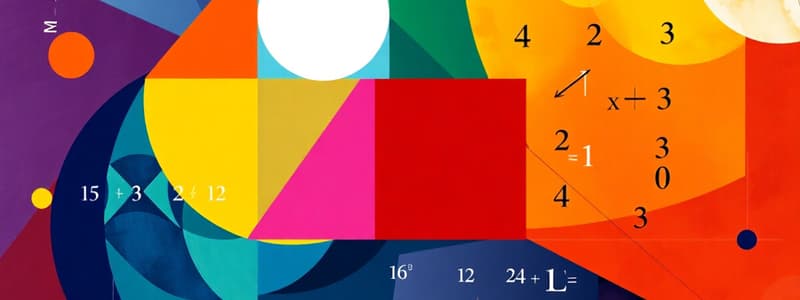Podcast
Questions and Answers
Which skill is most crucial for adapting learned mathematical principles to solve unfamiliar, real-world problems?
Which skill is most crucial for adapting learned mathematical principles to solve unfamiliar, real-world problems?
- Quantitative Reasoning
- Logical Reasoning
- Abstract Thinking
- Problem Solving (correct)
An engineer needs to optimize the design of a bridge to withstand specific load conditions and environmental factors. Which application of mathematics is most applicable?
An engineer needs to optimize the design of a bridge to withstand specific load conditions and environmental factors. Which application of mathematics is most applicable?
- Analyzing investment risk
- Developing algorithms
- Designing structures (correct)
- Modeling disease spread
A data scientist is tasked with identifying patterns and anomalies in a large dataset of patient records to improve healthcare outcomes. Which mathematical skills are most essential for this project?
A data scientist is tasked with identifying patterns and anomalies in a large dataset of patient records to improve healthcare outcomes. Which mathematical skills are most essential for this project?
- Critical Thinking and Quantitative Reasoning (correct)
- Abstract Thinking and Logical Reasoning
- Game Theory and Information Theory
- Number Theory and Combinatorics
Which branch of mathematics is most directly concerned with the study of strategic decision-making in situations where the outcome of one's choice depends critically on the choices of others?
Which branch of mathematics is most directly concerned with the study of strategic decision-making in situations where the outcome of one's choice depends critically on the choices of others?
When using numerical analysis to approximate solutions to complex mathematical problems, what potential trade-off must be carefully managed?
When using numerical analysis to approximate solutions to complex mathematical problems, what potential trade-off must be carefully managed?
Which of the following best describes the primary focus of pure mathematics?
Which of the following best describes the primary focus of pure mathematics?
A team of engineers uses differential equations to model the stress on a bridge under various load conditions. Which branch of mathematics are they primarily utilizing?
A team of engineers uses differential equations to model the stress on a bridge under various load conditions. Which branch of mathematics are they primarily utilizing?
A researcher aims to determine the average height of students in a school and analyze the distribution of heights. Which core area of mathematics is most relevant?
A researcher aims to determine the average height of students in a school and analyze the distribution of heights. Which core area of mathematics is most relevant?
Which mathematical concept is best described as a statement that has been proven true through logical arguments based on axioms and previously established theorems?
Which mathematical concept is best described as a statement that has been proven true through logical arguments based on axioms and previously established theorems?
In mathematical notation, what is the correct order of operations to evaluate the expression $2 + 3 \times (5 - 1)$?
In mathematical notation, what is the correct order of operations to evaluate the expression $2 + 3 \times (5 - 1)$?
A detective observes that every swan he has ever seen is white and concludes that all swans are white. What type of mathematical reasoning is he using?
A detective observes that every swan he has ever seen is white and concludes that all swans are white. What type of mathematical reasoning is he using?
A student is trying to solve a word problem about the number of apples in a basket. According to the problem-solving process, what is the first step the student should take?
A student is trying to solve a word problem about the number of apples in a basket. According to the problem-solving process, what is the first step the student should take?
Which of the following statements accurately distinguishes between algebra and arithmetic?
Which of the following statements accurately distinguishes between algebra and arithmetic?
Flashcards
Executing the Plan
Executing the Plan
Performing the plan's steps correctly.
Looking Back
Looking Back
Assessing the answer to confirm accuracy and relevance.
Critical Thinking
Critical Thinking
Analyzing, evaluating information to find solutions.
Logical Reasoning
Logical Reasoning
Signup and view all the flashcards
Problem Solving
Problem Solving
Signup and view all the flashcards
What is Mathematics?
What is Mathematics?
Signup and view all the flashcards
Pure Mathematics
Pure Mathematics
Signup and view all the flashcards
Applied Mathematics
Applied Mathematics
Signup and view all the flashcards
Arithmetic
Arithmetic
Signup and view all the flashcards
Algebra
Algebra
Signup and view all the flashcards
Geometry
Geometry
Signup and view all the flashcards
Equations
Equations
Signup and view all the flashcards
Functions
Functions
Signup and view all the flashcards
Study Notes
- Mathematics involves the study of numbers, quantity, space, patterns, structure, and change.
- Mathematics is a crucial tool in many fields worldwide, including natural science, engineering, medicine, finance, and social sciences.
- Mathematics is divided into pure and applied branches.
Pure Mathematics
- Focuses on mathematical concepts independent of applications outside of mathematics.
- Aims to expand mathematical knowledge for its own sake.
- Includes fields like number theory, algebra, geometry, and analysis.
Applied Mathematics
- Applies mathematical knowledge to other fields.
- Employs mathematical tools to address problems in science, engineering, business, and more.
- Includes fields like statistics, operations research, mathematical physics, and computational mathematics.
Core Areas of Mathematics
- Arithmetic: Basic operations use addition, subtraction, multiplication, and division on numbers.
- Algebra: Studies mathematical symbols alongside the rules for manipulating these symbols.
- Geometry: Focuses on shapes, sizes, and positions of figures in space.
- Calculus: Deals with continuous change, covering derivatives and integrals.
- Trigonometry: Examines relationships between angles and sides of triangles.
- Statistics: Pertains to the collection, analysis, interpretation, presentation, and organization of data.
- Probability: Centers on the analysis of random phenomena.
Mathematical Concepts
- Numbers: Encompass natural, integer, rational, irrational, and complex numbers.
- Variables: Represent unknown or changeable values using symbols.
- Equations: Assert the equality of two expressions.
- Functions: Map inputs to outputs through relationships.
- Theorems: Proven statements based on axioms and previously proven theorems.
- Proofs: Establish the truth of a statement through logical arguments.
Mathematical Notation
- Symbols: Represents numbers, variables, operations, and relationships.
- Conventions: Involves the order of operations (PEMDAS/BODMAS), use of parentheses, and standard symbols for common mathematical functions.
Mathematical Reasoning
- Deductive Reasoning: Involves drawing conclusions from known premises.
- Inductive Reasoning: Involves making generalizations via observations.
Mathematical Problem Solving
- Understanding the Problem: Requires a clear definition of the question that identifies what needs solving.
- Devising a Plan: Involves the choice of useful strategies, formulas, or methods.
- Carrying out the Plan: Requires accurate performance of the steps in the plan.
- Looking Back: Calls for checking the solution while also verifying that it is sensible.
Applications of Mathematics
- Science: Useful for modeling physical phenomena, analyzing data, and making predictions.
- Engineering: Useful for designing structures, developing algorithms, and optimizing systems.
- Medicine: Useful in medical imaging, data analysis, and modeling disease spread.
- Finance: Useful in investment analysis, risk management, and financial modeling.
- Computer Science: Provides the foundation for algorithms, data structures, and computational theory.
Key Mathematical Skills
- Critical Thinking: Analyzes and evaluates information to solve problems.
- Logical Reasoning: Constructs valid arguments and proofs.
- Problem Solving: Applies mathematical knowledge to address real-world problems.
- Abstract Thinking: Understands and works with abstract concepts and theories.
- Quantitative Reasoning: Interprets and uses numerical data.
Branches of Mathematics
- Number Theory: Focuses on properties of integers.
- Combinatorics: Studies counting and arrangements.
- Topology: Examines shapes and spaces.
- Game Theory: Examines strategic decision-making.
- Information Theory: Focuses on quantification, storage, and communication of information.
- Numerical Analysis: Uses algorithms that use numeric approximation for the problems of mathematical analysis.
Studying That Suits You
Use AI to generate personalized quizzes and flashcards to suit your learning preferences.




